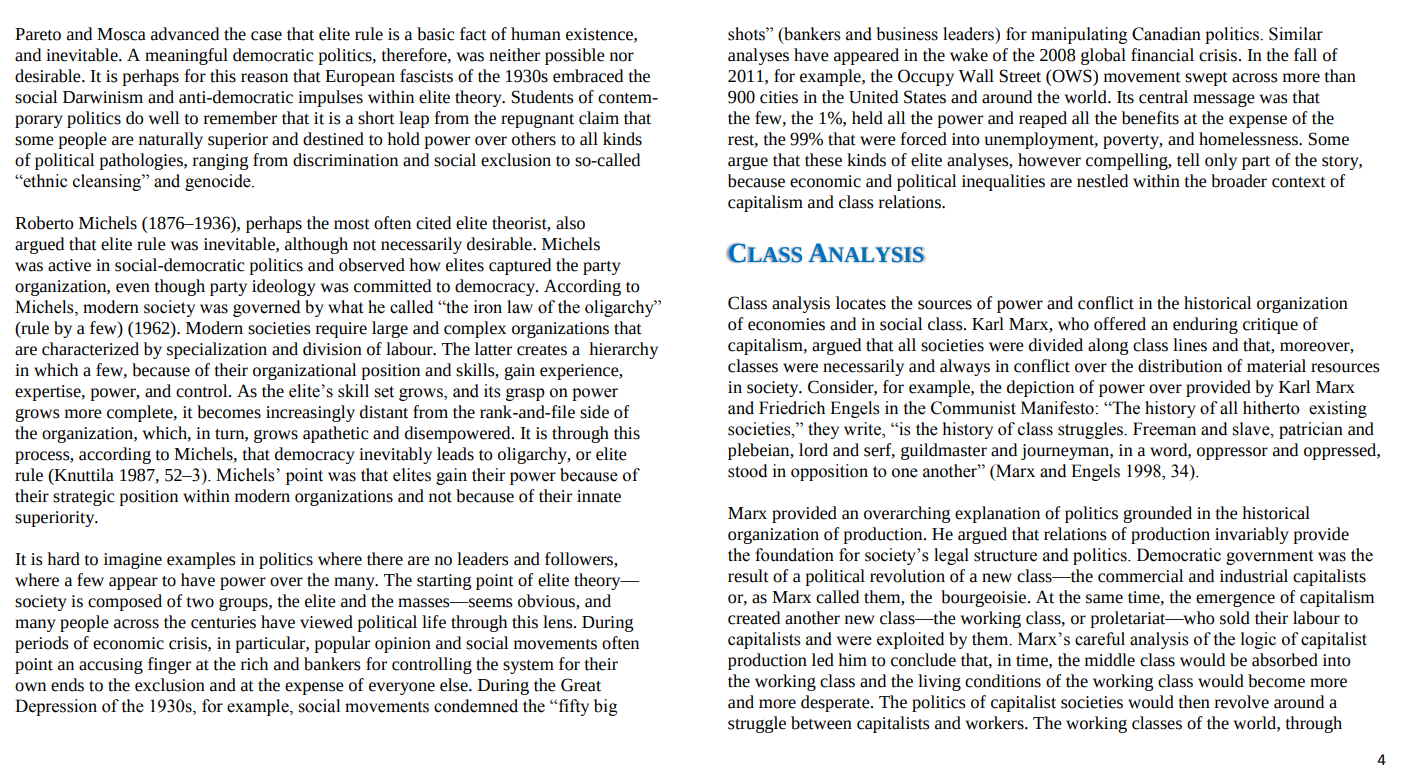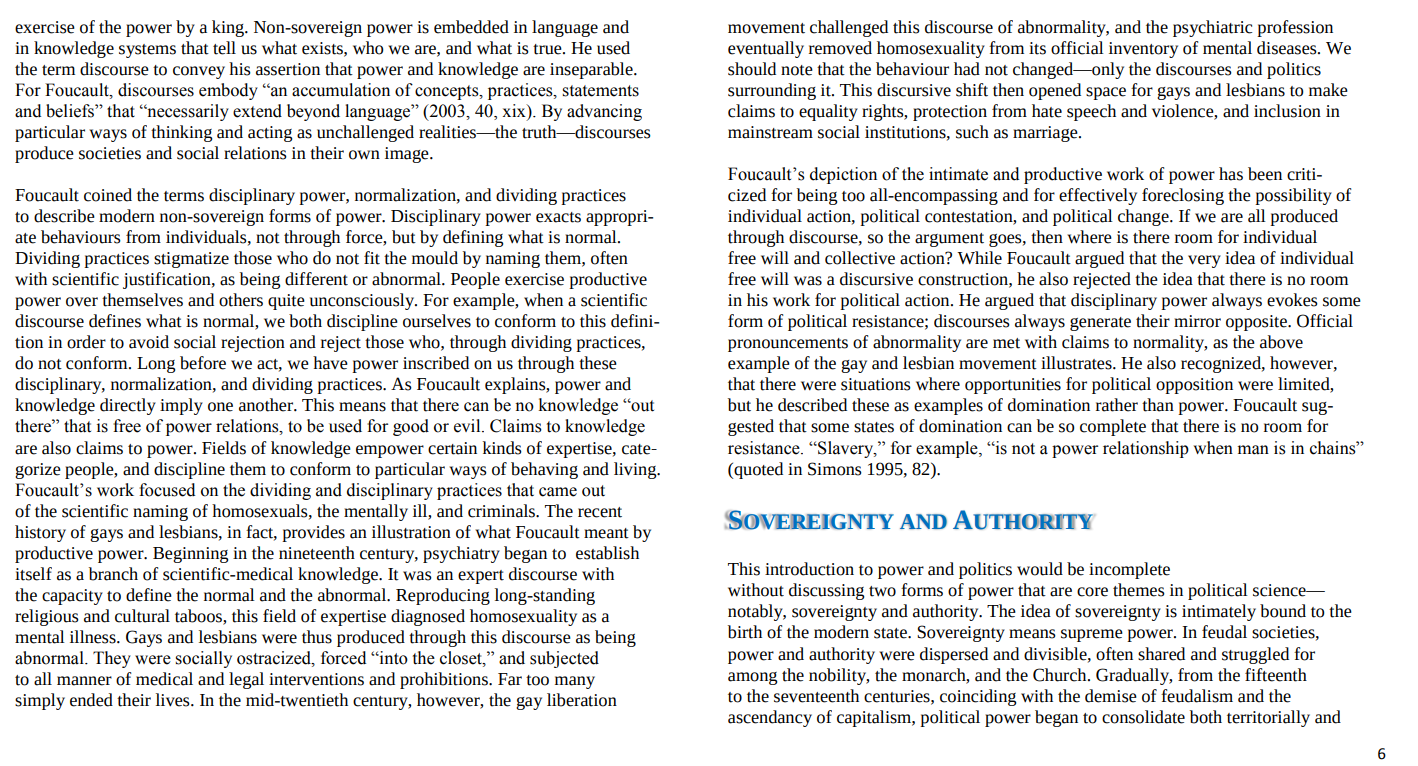This small essay by Janine Brodie called "Power and Politics" has several other issues, but their most frustrating one is their outright DISMISSAL of Marxist class analysis for the stupidest reasons. Economic determinism? I guess if you yearned to softly dismiss marx by misrepresenting him.
God I fucking hate poli sci majors.
The previous page:
Show


The next one:
Show


I'm not the brightest crayon in the box but is it just me or does Doctor Brodie somehow make politics and power some sort of vague, unsolvable mystery? Like fr I don't want just an echochamber of nodding heads plz help am I in the wrong?
I need help putting words to my issues with it.

Could one be both proletarian and slave? Depends on how you'd define slave and prole, I imagine many sorts of live in house help in cities might qualify.
Idk what Marx said about it
It's been awhile, but If I remember correctly, proles have to be free citizens, because they have to be free to move to where work is. While you could theoretically have a slave that you contract out to industries, the fact that you have to make a contract with an owner means you bear a fiduciary duty to that person that you (at the time of writing) did not owe to a prole. However, contracting slave labor for factory work did not fit the model of slave-based production at the time (the Southern U.S. being the model Marx would be discussing).
Now that doesn't mean that most proles aren't engaged in wage slavery, but that is a fundamentally different animal than legal slavery, as the slave is not a legal 'person' but instead a literal commodity, the slave being the commodity rather than strictly the labor the slave provides.
Personally I don't really think so. A slave is property, can be bought and sold, doesn't have the freedom to attempt to find work elsewhere.
Ah, so it would just be a slave doing city things, going and getting groceries etc but avoiding that specific part of proletarianisation
Yeah, there were many urban slaves in the northern colonies/states in early America, for example, and they also did housework, waiting on their owners, childcare, and things like that.
I lost the thread on this conversation with my earlier reply. Yes, there were many urban slaves, no, they weren't proles. Proles work for wages (or commission or salary) which they use to buy their means of subsistence; slaves work for free and are given means of subsistence (most of the time) simply so they can keep performing their duties.
Engels has written this about slaves/proles, can't right now remember exactly where it is from, but happened to have it handy:
In what way do proletarians differ from slaves? The slave is sold once and for all; the proletarian must sell himself daily and hourly.
The individual slave, property of one master, is assured an existence, however miserable it may be, because of the master’s interest. The individual proletarian, property as it were of the entire bourgeois class which buys his labor only when someone has need of it, has no secure existence. This existence is assured only to the class as a whole.
The slave is outside competition; the proletarian is in it and experiences all its vagaries.
The slave counts as a thing, not as a member of society. Thus, the slave can have a better existence than the proletarian, while the proletarian belongs to a higher stage of social development and, himself, stands on a higher social level than the slave.
The slave frees himself when, of all the relations of private property, he abolishes only the relation of slavery and thereby becomes a proletarian; the proletarian can free himself only by abolishing private property in general.
I think both are the products of vastly different demographic and productive contexts. The slave is economically viable when the difference between the average productivity of labor(which is the value produced by labor) and the marginal productivity of labor(which liberal economists consider equal to the wage, they are wrong but for simplicity let's say they are close enough) is very low. This forces the overlord to apply maximum coercion in order to extract surplus. But coercion is expensive, so as the gap between these 2 quantities grows naked coercion is relaxed. Until you get to a "free market". But even the reserve army of labor is a form of coercion since it serves too keep wages under the mpl.
So from an economic perspective being a slave and a proletariat are at opposite ends of economic conditions.
Note that this gap is defined by the productive technology but it does not necessarily mean that the gap grows as society advances technologically.
Also note that this also applies to high value slaves like the ones in the medieval Islamic societies, that were generals, scribes and administrators.
I was thinking more a live in house-worker in a wealthy household (but in an otherwise poor city) who gets room and board but also has their passport taken and the authorities go looking for them if they are missing for a day, but also sometimes they do the groceries and get access to dad's credit card to facilitate such ends, but doesn't really have the capacity to own property, vote, participate in society etc etc. They certainly participate in some proletarian activities and relationships, but also some slave-y ones.
Not saying that this would be the majority of people in any economy, just exploring if its possible to be both Proletarian and a Slave. Someone else in this thread says that an important part of being a prole is being able to move to where the jobs are and choose which jobs they do (on some level; its never that clear cut).
I get what you mean. As other people in the tread have said, the relationship between a proletarian and production is wage labor. Mobility is indeed an important part of that, as well as being a nominally free individual. So it's not so much what job they are doing, or their other social relationships.
But these liminal examples do rise the concern that our definitions can be too rigid.
I thought of 2 other related points between my last post and this one. The first is about tenancy. As the marginal productivity of agricultural workers falls, the become landless, and eventually end up working the land for a fee or corvee. The same conditions that correlate with tenancy also do so with proletarisation, the difference in outcomes for different regions seems to be related to mobility, and the development of nearby urban networks.
The second was about eastern European serfs, who had become tenants, tied to the land and owed the landlord a corvee. But as agricultural productivity fell with respect to labor productivity on urban areas, landlords decided it was more profitable to let the serfs work in the city and then pay them a fee. So these people belonged to 2 different contexts, on the one hand their relationship to production was that of proletarians, on the other they were also explored by the landlord who had customary rights over them.
This is another example of how definitions can become too rigid, and can't represent Al the nuances of the real world. At the same time clear definitions help us understand the difference in this case between the material and customary relationships. In this example the landlords went to the dustbin of history because they no longer had an economic base.
What Marx said about it (emphasis added)
Aristotle therefore, himself, tells us what barred the way to his further analysis; it was the absence of any concept of value. What is that equal something, that common substance, which admits of the value of the beds being expressed by a house? Such a thing, in truth, cannot exist, says Aristotle. And why not? Compared with the beds, the house does represent something equal to them, in so far as it represents what is really equal, both in the beds and the house. And that is – human labour.
There was, however, an important fact which prevented Aristotle from seeing that, to attribute value to commodities, is merely a mode of expressing all labour as equal human labour, and consequently as labour of equal quality. Greek society was founded upon slavery, and had, therefore, for its natural basis, the inequality of men and of their labour powers. The secret of the expression of value, namely, that all kinds of labour are equal and equivalent, because, and so far as they are human labour in general, cannot be deciphered, until the notion of human equality has already acquired the fixity of a popular prejudice. This, however, is possible only in a society in which the great mass of the produce of labour takes the form of commodities, in which, consequently, the dominant relation between man and man, is that of owners of commodities. The brilliancy of Aristotle’s genius is shown by this alone, that he discovered, in the expression of the value of commodities, a relation of equality. The peculiar conditions of the society in which he lived, alone prevented him from discovering what, “in truth,” was at the bottom of this equality.